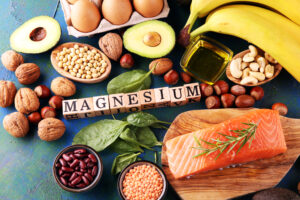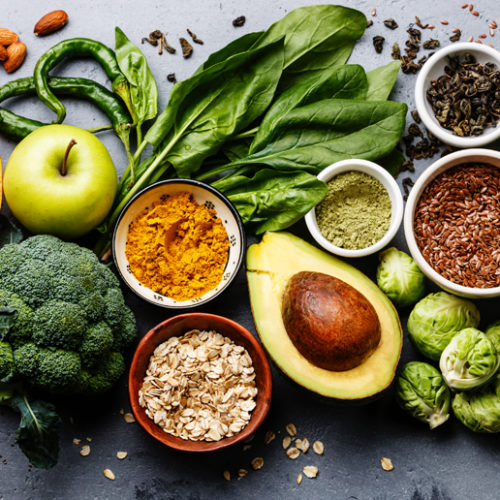The role of magnesium for postpartum mothers

Navigating the postpartum period can be both exhilarating and challenging for new mothers. Through the joys and the adjustments, prioritising your nutrition is of paramount importance, and this includes magnesium!
Magnesium is a super mineral that supports a variety of functions within your body. These include extracting energy from food, regulating muscle and nerve function, maintaining healthy blood sugar levels, and also making protein, bone and DNA. It is widely known as a wonderful remedy for poor sleep as it helps your body relax into a deeper slumber.
Magnesium is a major mineral, meaning we need greater amounts of it than other trace minerals, such as iodine or selenium. The recommended daily amount for women is 310-320 mg, but this rises to 400 mg during pregnancy and remains high, at 360 mg per day, for postpartum and breastfeeding mothers.
Natural sources
So, with this in mind, if you are a new mother, or simply looking to increase your magnesium intake through food, here are some great dietary sources to consider.
Dark chocolate
It’s not often that a delicious treat (in moderation of course!) is also healthy. Dark chocolate has a number of health benefits, one of which is that it is a rich source of magnesium, providing 65 mg in a 28 gram serving. Additionally, it packs an antioxidant punch, being full of flavanols, antioxidants linked with lowering heart disease, and polyphenols, which protect against inflammation.
Avocados
You can get a whopping 58 mg of magnesium from a humble avocado, making it a wonderful way to eat your recommended intake! These tasty fruits are also strong sources of potassium, B vitamins and vitamin K, as well as heart-healthy monounsaturated fat. To top it off, avocado will also provide you with a great dose of fibre – an all-round superfood!
Nuts and seeds
A fantastic, portable snack, nuts and seeds make a highly nutritious addition to your diet! For example 28 gram serving of cashews will give you an astounding 83 mg of magnesium! Here are the nuts and seeds that have the most magnesium:
- Brazil nuts
- Chia seeds
- Cashews
- Almonds
- Pumpkin seeds
Nuts and seeds are also good sources of protein, healthy fats, fibres, vitamins and minerals. The fat they contain is unsaturated, meaning these tasty snacks can also provide protective effects against heart disease and diabetes.
Legumes
When we say ‘legumes’, we are referring to a family of high nutrient plants that include lentils, beans, chickpeas, peas and soybeans.
These plants have a lot of nutritional power, particularly when it comes to magnesium. For example, a cup of cooked black beans will give you 120 mg of this wonder mineral.
On top of this, legumes are hugely versatile, working in many different kinds of meals, and they make for a great source of plant-based protein.
Whole grains
Grains and pseudocereals, such as wheat, oats, millet, rye, buckwheat and quinoa, are excellent sources of magnesium.
One slice of whole wheat bread will provide 27 mg of magnesium, a normal serving of cereal should give you approximately 85-95 mg and a half cup of cooked quinoa will offer around 60-65 mg of this essential mineral.
An easy way to incorporate these into your diet is to focus on swapping white bread and pasta for their whole grain counterparts, and to consider sneaking a serving of oats into your day, through homemade granola, smoothies or porridge.
Many whole grains are also high in B vitamins, selenium, manganese and fibre. Studies have indicated that whole grains may even reduce redness, swelling and inflammation within the body, and lower risk factors for heart disease.
Leafy greens
Leafy greens, such as kale, spinach, mustard greens and Swiss chard, are well-known for being incredibly healthy. Happily, they are also rich sources of magnesium, making them invaluable additions to any postpartum diet. These nutrient-dense greens not only provide a substantial dose of magnesium, but also offer an array of vitamins, minerals and antioxidants, such as iron, manganese, and vitamins A, C and K – all of which are essential for maternal health. Incorporating leafy greens into salads, stir-fries or even smoothies can effortlessly boost your magnesium intake, aiding in proper postpartum recovery and a boosted sense of overall wellbeing!
Bananas
Bananas are a convenient and delicious way to increase magnesium intake for postpartum mothers on the go. With their natural sweetness and creamy texture, bananas are an excellent snack option to satisfy any cravings, while also providing a significant source of magnesium. Whether enjoyed on their own, blended into smoothies or sliced over oatmeal, bananas offer a quick and portable solution to replenish magnesium levels and support maternal health during the postpartum period.
Benefits of magnesium postpartum
Magnesium plays a big role in supporting postpartum mothers through various physiological and emotional challenges. Firstly, magnesium aids in muscle relaxation, which can alleviate postpartum cramping and promote better overall physical comfort during recovery. Additionally, this mineral contributes to energy production, combating fatigue and enhancing vitality during the demands of those first precious (but exhausting!) months. Moreover, magnesium is closely linked to mood regulation and stress management, helping to mitigate the spectre of postpartum depression and anxiety. Magnesium lowers stress and tension in the body, as it influences our neurotransmitters and soothes the nervous system. By supporting these essential functions, magnesium is a wonderful mineral to give your body for a smoother transition into motherhood, with better energy, physicality and a clearer mental headspace. Here are some specific benefits:
- Enhances sleep quality
- Alleviates muscle tension
- Supports bone health for breastfeeding mothers
- Relieves muscle cramps
- Aids in regulating digestion
- Reduces neck and back tension
It’s clear that magnesium is indispensable during the transformative postpartum period. With the recommended daily intake elevated for new and breastfeeding mothers, incorporating magnesium-rich foods into your diet is incredibly important. By eating more of the many foods we’ve discussed, you should be able to add to your intake of this super mineral in lots of simple ways!
Image Credit: Shutterstock












Comments